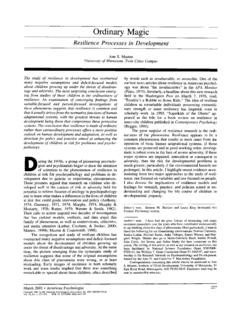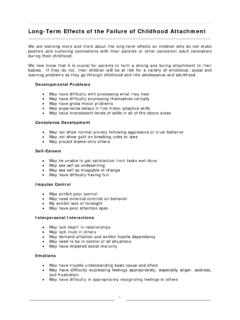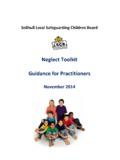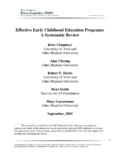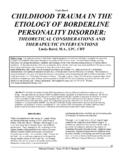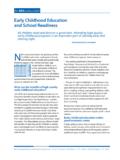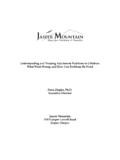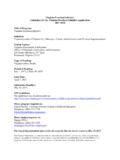Transcription of Erikson’s Psychosocial Stages Summary Chart
1 erikson s Psychosocial Stages Summary Chart stage Basic Conflict Important Events Key Questions to be answered Outcome Infancy (0 to 18 months) Trust vs. Mistrust Feeding/ Comfort Is my world safe? Children develop a sense of trust when caregivers provide reliability, care and affection. A lack of this will lead to mistrust. Early Childhood (2 to 3) Autonomy vs. Shame and Doubt Toilet Training/ Dressing Can I do things by myself or need I always rely on others? Children need to develop a sense of personal control over physical skills and a sense of independence.
2 Success leads to feeling of autonomy, failure results in feelings of shame and doubt. Preschool (3 to 5) Initiative vs. Guilt Exploration/ Play Am I good or bad? Children need to begin asserting control and power over the environment. Success in this state leads to a sense of purpose. Children who try to exert too much power experience disapproval, resulting in a sense of guilt. School Age (6 to 11) Industry vs. Inferiority School/ Activities How can I be good? Children need to cope with new social and academic demands. Success leads to a sense of competence, while failure results in feeling of inferiority. Adolescence (12 to 18) Identity vs. Role Confusion Social Relationships/ Identity Who am I and where am I going?
3 Teens need to develop a sense of self and personal identity. Success leads to an ability to stay true to yourself, while failure leads to role confusion and a weak sense of self. Young Adult (19 to 40) Intimacy vs. Isolation Intimate Relationships Am I loved and wanted? Young adults need to form intimate, loving relationships with other people. Success leads to strong relationships, while failure results in loneliness and isolation. Middle Adulthood ( 40 to 65) Generativity vs. Stagnation Work and Parenthood Will I provide something of real value? Adults need to create or nurture things that will outlast them, often by having children or creating a positive change that benefits other people.
4 Success leads to feelings of usefulness and accomplishment, while failure results in shallow involvement in the world. Maturity (65 to death) Ego Identity vs. Despair Reflection on life Have I lived a full life? Older adults need to look back on life and feel a sense of fulfillment. Success at this state leads to a feeling of wisdom, while failure results in regret, bitterness, and despair. Long-Term Consequences of Child Abuse and Neglect Impact The impact of child abuse and neglect is often discussed in terms of physical, psychological, behavioral, and societal consequences. In reality, however, it is impossible to separate them completely.
5 Physical consequences (such as damage to a child s growing brain) can have psychological implications (cognitive delays or emotional difficulties, for example). Psychological problems often manifest as high-risk behaviors. Depression and anxiety, for example, may make a person more likely to smoke, abuse alcohol or illicit drugs, or overeat. High-risk behaviors, in turn, can lead to long-term physical health problems such as sexually transmitted diseases, cancer, and obesity. Factors Affecting the Consequences of Child Abuse Not all abused and neglected children will experience long-term consequences. Outcomes of individual cases vary widely and are affected by a combination of factors, including: The child s age and developmental status when the abuse or neglect occurred The type of abuse (physical abuse, neglect, sexual abuse, etc.)
6 Frequency, duration, and severity of abuse Relationship between the victim and his or her abuser (Chalk, Gibbons, & Scarupa, 2002). Physical Health Consequences The immediate physical effects of abuse or neglect can be relatively minor (bruises or cuts) or severe (broken bones, hemorrhage, or even death). In some cases the physical effects are temporary; however, the pain and suffering they cause a child should not be discounted. Long term impact may include: Impaired brain development Poor physical health Psychological Consequences The immediate emotional effects of abuse and neglect - isolation, fear, and an inability to trust - can translate into lifelong consequences including low self-esteem, depression, and relationship difficulties.
7 Researchers have identified links between child abuse and neglect and the following: Poor mental and emotional health Cognitive difficulties Social difficulties Behavioral Consequences Not all victims of child abuse and neglect will experience behavioral consequences; however, child abuse and neglect appear to make the following more likely: Difficulties during adolescence Juvenile delinquency and adult criminality Alcohol and other drug abuse Abusive behavior Adapted from: National Clearinghouse on Child Abuse and Neglect Information Department of Health and Human Services
